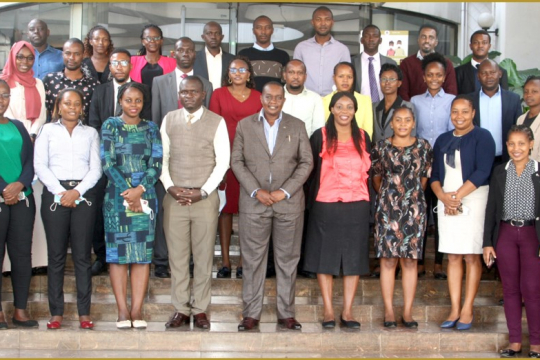The graduates from the Inclusive Green Economy program, IGE fellows, organized a workshop with the help of the IGE support team to train their colleagues on inclusive green economy. The participants learned that transitioning to an inclusive green economy means achieving low carbon emissions, using resources efficiently, and leaving no one behind (social inclusion).
The workshop was held on 31st January 2022 and had 30 participants. This activity concluded the first edition of the IGE Program. The second cohort will start in March 2022. The most important insights in this workshop were:
Why IGE?
The participants learned that IGE is the interface between the economic, environmental, and social dimensions. They learned that it reduces inequality and exclusion that constrain growth and environmental sustainability. Hence, IGE is the path for sustainable development.
What are the various policy instruments?
They learned about the various environmental policy instruments which enable people and firms to take into consideration the indirect costs and reduce emissions while maximizing social welfare. These were placed in four categories:
- Price-based policy instruments
- Rights-based policy instruments
- Regulatory/command-and-control policy instruments
- Information based policy instruments
A mix of policy instruments is the most ideal measure for the overall success of the environmental policy.
How to plan and budget for an inclusive green economy?
The training also highlighted that to promote IGE in a country it is necessary to coordinate the planning and budgeting processes. For example, specific policies, programs, and projects could integrate the IGE concept in the Fourth Medium Term Plan 2023-2027 (MTP IV) preparation process.
Furthermore, for the government to allocate resources to the IGE program, there are several criteria that they look at:
- What is the link of the program to the ‘Big Four' agenda comprising of manufacturing, food security, affordable housing, and healthcare?
- What is the degree to which the program addresses job creation and poverty reduction?
- Is the program cost-effective and sustainable, and others.
To conclude, round table discussions were conducted, to identify important actions necessary for the implementation of IGE in the country. These were creating a ministerial committee in charge of IGE, developing indicators to track IGE, increasing awareness through more capacity building and by having volunteer champions, and conducting monitoring and evaluation of IGE.
Besides, participants commented on ideas of integrating IGE in work plans, strategic plans, and work review, incorporating IGE in learning, incorporating technology in IGE, and developing a stakeholder engagement comprising both private and public civil servants.
What are your thoughts about the workshop?
“It was a nice learning experience,” said Lucy Kariuki. I look forward to attending more similar engagements.
By: Jane Maina
